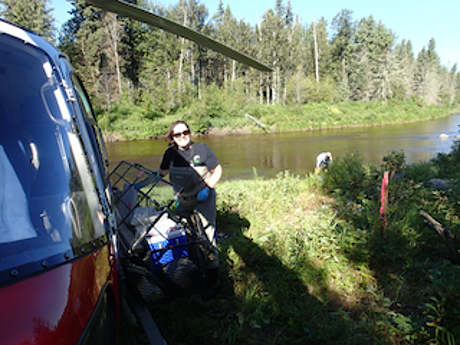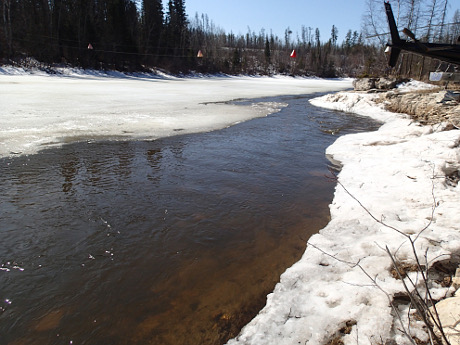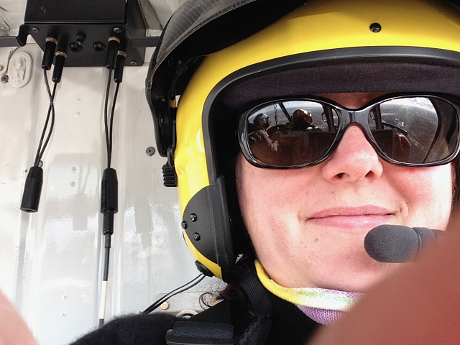Spotlight on science: Indigenous recruitment and retention - Alexa Alexander-Trusiak
Profile of Alexa Alexander-Trusiak, PhD
Indigenous recruitment and retention

Alexa is an ECCC research scientist in the Watershed Hydrology and Ecology Research Division co-located at the University of New Brunswick in Fredericton. She served as the first Manager of ECCC’s Indigenous Science Division, as one of ECCC’s delegates to the Indigenous Science, Technology, Engineering, and Mathematics (STEM) cluster, and as part of the Canadian Delegation to the United Nations. Alexa leads on projects and programs that involve multiple stressors, cumulative effects or involve extensive co-development with diverse stakeholders. She is passionate about working with and helping students and works to attract Indigenous youth into university programming, facilitate meaningful work opportunities, and to increase recruitment and retention of students into the public service.

Initially, she took on this role from the side of her desk. But since 2020, when she was asked to serve as chair of Water Science and Technology Directorate’s (WSTD) Indigenous Recruitment and Retention Committee, she’s been able to lean in on her passion, resulting in considerable departmental gains in this important area.
The recruitment of Indigenous students does not only focus on subjects related to water but it also includes forestry, wildlife and core science. It is with a search tool that Alexa can easily make connections between students and researchers by entering the qualifications sought. This greatly facilitates the identification of educational institutions across Canada that meet ECCC’s current and emerging needs.
Prioritizing student aspirations

“When we prioritize our students, we are laying a foundation in support of future generations” Alexa says. This passion for supporting the aspirations of students has a long history who got her start through a series of supportive mentors. “I’ve been very lucky, so many people have helped me along the way” she says. “Growing up in a number of different communities in northern Ontario, I attended schools that didn’t offer classes like Calculus.”
To become eligible to apply to university science programs required Alexa to seize opportunities like remote distance education and online learning.
That’s no small part of why Alexa took up her substantive position as a co-located ECCC research scientist at the University of New Brunswick in Fredericton. “I joined this team because it created a wonderful opportunity to help students further their aspirations.”
Alexa has mentored over 75 students and staff since joining ECCC in 2016. Over 80 per cent of Alexa’s students are members of one or more equity groups, and many have gone on to permanent positions in the public service.
A leading expert in multiple stressors

When she’s not mentoring the next generation of scientists and policy analysts, Alexa is working on multiple stressors and cumulative effects. Her work on the non-target impacts of neonicotinoid insecticides provided some of the earliest and most persuasive evidence of the potent effects of these compounds on aquatic species. That work has been cited in the latest Canadian Council of Ministers of the Environment (CCME) guidelines and has resulted in Alexa being highly sought after for her expertise on multiple stressors both nationally and abroad. That, however, was just the beginning.
Since joining ECCC, Alexa has gone on to develop cutting-edge data mining techniques and geospatial tools in support of the Oil Sands Program, advance existing methods to assess climate change as well as cumulative impacts of mining with numerous academic and industrial partners. Most recently, her students completed a series of field studies to better understand the over 20-year history of fish kills in Prince Edward Island streams. Throughout her research program, Alexa’s work has focused on building relationships that are mutually beneficial and long-term, so that her research benefits all Canadians.
What’s next?
Alexa knows that magic can happen when students and staff from different backgrounds are working together. “I think that might be my favorite part – bringing folks together – and seeing how far we can take the ideas that come out of those conversations” she says. “I find that if you make the well-being and ongoing success of your team your top priority, it’s amazing how quickly even small incremental gains can start to multiply into serious progress.”